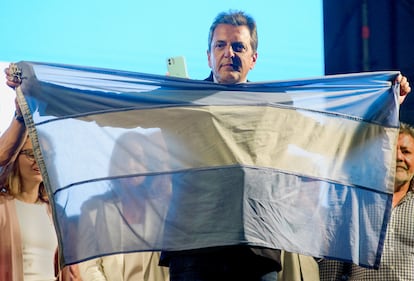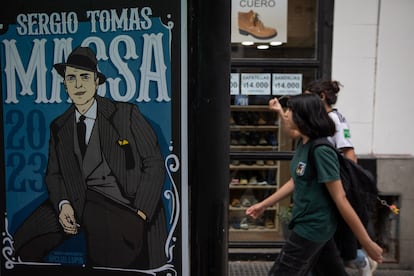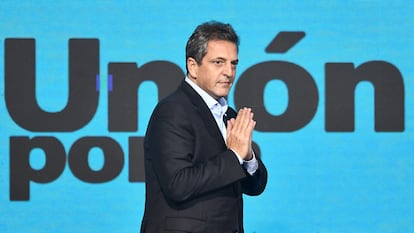Sergio Massa, the incombustible politician
At the age of 51, Argentina’s minister of economy — who is the candidate for the center-left coalition in this Sunday’s presidential election — has shown himself to be ideologically adaptable throughout his long career in politics


In 1994, the Argentine trade unionist Luis Barrionuevo received Sergio Massa at his home. At 22-years-old, Massa was a young militant of the Union of the Democratic Center (UCD), a right-wing neoliberal party. He was about to change sides for the first time in his life.
“In politics, I have all the Indians [Indigenous people] that I could want. What I now need is someone who can put on a suit and tie,” Barrionuevo told the young man, thus anointing him as a full member of the center-left Peronist movement.
Massa came from an upper-middle-class family in San Martín, on the outskirts of Buenos Aires. He studied at a private school; his father was a builder. After dabbling in right-wing politics (and learning how to wear a suit) he launched, with conviction, into an unstoppable upward race. This Sunday, at the age of 51, he will try to become president of Argentina by defeating far-right economist Javier Milei in a runoff election.

When he visited Barrionuevo, Massa had been flirting for some time with the idea of making the leap from the UCD to the center-left party built on the legacy of Juan Perón, who ruled Argentina from 1946-1955 and from 1973-1974. From the young age of 17, he had already participated in marches organized by Graciela Camaño — Barrionevuo’s wife, who is now a legislator.
However, after Carlos Menem won the presidency in 1989, he thought that the neoliberal ideas promoted by this leader weren’t too different from his own. The UCD eventually ended up being swallowed by Menem’s cult of personality… but by then, Massa had already jumped ship. This instinct has been key to his political survival — he knows when to go before the bad weather hits.
Massa has been a Menemist, a Duhaldist (Eduardo Duhalde served briefly as president from 2002-2003), a Kirchnerist — serving both left-wing presidents Néstor Kirchner (2003-2007) and Cristina Kirchner (2007-2015) — and an anti-Kirchnerist. Today, he’s a Kirchernist-Peronist again (as Cristina Kirchner is the outgoing vice president). This ideological fluidity, however, never distracted Massa from his ultimate goal: becoming president.
Few know Massa as well as Camaño, the woman who introduced him to political life. “Evidently, he’s no longer the same person from the late-1980s,” she notes. “He’s someone who has grown a lot, for better and for worse, because nobody’s perfect.”
“Sergio is resilient. He plays the game: he’s not conservative, he’s a guy who takes risks. He doesn’t speculate, he doesn’t sit on the sidelines,” she summarizes. She refers to him as “her dolphin.” The two old friends are now estranged.
Taking risks is an asset in politics. And all those who know Massa agree that this is one of his main characteristics. When he took over the Ministry of Economy just 14 months ago, Argentina was sinking, but Massa knew that he had been given the opportunity he had long been waiting for. If he did the job well, he had the chance of reaching the presidential palace. And, if he failed, all he would have to do is step aside and try again later. After all, he already ran for the presidency and lost before, in 2015.
Camaño says that Massa’s daring attitude and unconcealed ambition come from birth. “He was 18 years old and already wanted to participate in the group leaders’ meetings. ‘If you want to get involved,’ I told him, ‘you have to have a basic unit’ (a branch of a party in a district). He asked his father for the money required to set up a unit. His [land-developer] father said yes… but on the condition that he put ‘a true Peronist’ in charge. He called one of the guys from the construction company [to help his son]. In order to get his foot in the door, Sergio accepted the conditions,” Camaño recalls.
Massa is a lawyer by training. He has two children with Malena Galmarini. In addition to a marriage, the couple has a political partnership. They got married in 2001, just months before the cost-of-living and inflationary crisis broke out. Carlos Menem (who was out of office) attended the wedding. And, by 2002, Massa had already allied himself with Peronist President Eduardo Duhalde — Menem’s sworn enemy. Duhalde noticed the potential of this 30-year-old leader and gave him control of the National Social Security Administration, the agency with the second-largest budget in the country. It took Massa a few months to convince Duhalde that he should increase pensions, which had been frozen since the 1990s. The popularity of the young official — who brought the media along as he made the rounds solving pensioners’ problems — spread like wildfire.

He maintained the position with the arrival of President Néstor Kirchner in 2003. He left it to run for mayor of the municipality of Tigre, on the northern outskirts of Buenos Aires. He won the elections in 2007 and, in July 2008, Cristina Kirchner — the former first lady, who had just taken office — named him her chief-of-staff. He replaced Alberto Fernández — the current president — and appointed Juan Abal Medina (a renowned Kirchnerist militant) as his deputy.
“I learned a lot from him, because he’s a management machine,” Abal Medina affirms. “He’s someone who cares more about making principles into a reality, rather than theorizing about them.” His former deputy remembers exhausting days where Massa would text him at four in the morning to ask him a question.
With the leadership of the cabinet, Massa’s political path accelerated. Néstor Kirchner never completely trusted the minister who rubbed shoulders with powerful businessmen and bankers, never demonstrating the docility that was expected of him. One of those businessmen — who asks to remain anonymous — says that Massa, unlike the rest of the top officials within the Kirchner-aligned parties, “always maintained a tough position towards Venezuela and Cuba and had a good relationship with the United States.” For instance, Massa forged a “father and son” relationship with banker Jorge Brito (who died in a 2020 helicopter accident) that helped him “open networks everywhere”
Camaño agrees that Massa “has the most important national and international profile in Argentina. I don’t think there’s a politician who hasn’t spoken with Sergio at some point,” she notes.
Gustavo Pandiani — a diplomat who has accompanied Massa for more than two decades — agrees with Camaño. “In the last ten years, he’s developed, at least, a strategic link with the main figures in the United States and Brazil.” Pandiani — who is a possible foreign minister in a Massa administration — has also suffered from those early-morning phone calls. “He never disconnects,” the diplomat emphasizes.
In 2009, Massa left his position as Cristina Kirchner’s chief-of-staff. Abal Medina assures EL PAÍS that this was one of the reasons why her party was defeated in the legislative elections that year. “He left feeling distant, but not angry. He continued, for example, talking to Néstor. I called him when Néstor died (on October 27, 2010) to let him know. He told me that he had met with (the former president) a few days earlier,” he reveals. The former minister then returned to the mayorship of Tigre, filled his district with security cameras and implemented a tough-on-crime policy. Those were the days when he got along with Rudy Giuliani, the former mayor of New York City, who was making money as a security consultant. And, in 2013 — as her presidency was in its closing years — he split completely from President Cristina Kirchner. Abal Medina assures EL PAÍS that this was nothing personal. Rather, “their differences couldn’t be resolved and — like many in the Peronist movement — they ended up separating.” However, given the public nature of the break, if there was nothing personal, Massa certainly took pains to hide it.

That year, he ran to be a deputy in Buenos Aires with his own party. Facing Martín Insaurralde — the president’s hand-picked candidate — he won a seat and his party picked up four million votes. Massa suddenly became a political star — the man capable of defeating “the boss.” He believed that his time had come: shortly after becoming a federal legislator, he launched his candidacy for the presidency. With his small Frente Renovador party (Total Renewal Front), he offered himself up as a representative of “new Peronism.” During the campaign, he promised to arrest Kirchner and her son for corruption. But Argentina was already looking at businessman Mauricio Macri, who was wrapping up two terms as governor of Buenos Aires. In the 2015 presidential election, Massa came third, with 21% of the vote. And then, he made yet another political switch: Macri adopted him as a responsible opponent, one who would accompany him for a good part of the administration. Massa’s bloc frequently voted with Macri’s coalition in Congress.
The closeness with Macri, however, dried up in 2017, after the legislative elections. The Frente Renovador kept losing allies, who rejoined the ranks of the traditional left-wing parties — the Peronists were angry with their leader’s pact with Macri. Funnily enough, a year later, Massa engaged in another act of absolute pragmatism: he joined the coalition set up by Alberto Fernández and Cristina Kirchner, who were seeking the presidency and vice presidency in 2019. The prodigal son of Peronism would come to power again…. this time as a minority partner of the woman he had once promised to imprison.
After Fernández and Kirchner took power in 2019, Massa took refuge in Congress, as president of the Chamber of Deputies. He waited patiently while he watched the fight between the president and the vice president drag the country into the abyss. When the inflationary crisis worsened, all eyes fell on him again: the man who had stayed out of the fratricidal war that was bleeding the center-left alliance dry.
President Alberto Fernández finally named him to the Ministry of Economy. Massa prepared to fight the definitive battle for the presidency. However, the results of his tenure aren’t encouraging: inflation exceeds 140%, GDP has continued to decline, while the Central Bank’s reserves are in the red. But Massa was able — at least — to close a complex negotiation with the International Monetary Fund (IMF). Argentina owes $44 billion to the organization — the money that Macri’s administration received in 2018 as a financial bailout.
The agreement allowed Massa to showcase his good international relations. The aforementioned powerful businessman — who doesn’t wish to give his name — sums it up like this: “[Massa] closed the deal from a computer in his home, talking to officials from the IMF and the [U.S.] State Department.”
The Argentina center-left ended up embracing the leader who once betrayed them, as a question of political survival. If Massa wins the elections, the Peronist movement will have offered up a new example of ideological malleability, with a turn towards the center-right that was unthinkable just four years ago. The scenario, however, is extremely complex and challenging. A veteran Peronist — the survivor of a thousand battles — says that, for Massa, this is an ideal scenario. “The worse the situation is, the less he has to deliver… [this makes him] calm.” This militant describes Massa as “a pragmatist with no interest in history, nor in moral or philosophical ideas.”
“He’s more of a Néstor than a Cristina Kirchner,” summarizes Abal Medina. “A man of action,” Camaño adds. Milei — his rival this Sunday — would say that the minister is nothing more than a member of the political class that he is promising to “exterminate.”
Sign up for our weekly newsletter to get more English-language news coverage from EL PAÍS USA Edition
Tu suscripción se está usando en otro dispositivo
¿Quieres añadir otro usuario a tu suscripción?
Si continúas leyendo en este dispositivo, no se podrá leer en el otro.
FlechaTu suscripción se está usando en otro dispositivo y solo puedes acceder a EL PAÍS desde un dispositivo a la vez.
Si quieres compartir tu cuenta, cambia tu suscripción a la modalidad Premium, así podrás añadir otro usuario. Cada uno accederá con su propia cuenta de email, lo que os permitirá personalizar vuestra experiencia en EL PAÍS.
¿Tienes una suscripción de empresa? Accede aquí para contratar más cuentas.
En el caso de no saber quién está usando tu cuenta, te recomendamos cambiar tu contraseña aquí.
Si decides continuar compartiendo tu cuenta, este mensaje se mostrará en tu dispositivo y en el de la otra persona que está usando tu cuenta de forma indefinida, afectando a tu experiencia de lectura. Puedes consultar aquí los términos y condiciones de la suscripción digital.








































